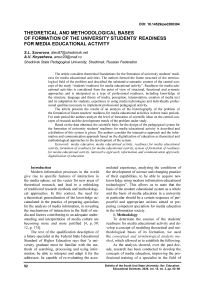Theoretical and methodological bases of formation of the university students' readiness for media educational activity
Автор: Suvorova S.L., Knyazheva A.V.
Рубрика: Непрерывное образование в течение жизни. Образование разных уровней
Статья в выпуске: 3 т.12, 2020 года.
Бесплатный доступ
The article considers theoretical foundations for the formation of university students' readiness for media educational activities. The authors formed the frame structure of the terminological field of the problem and described the substantive-semantic content of the central concept of the study “students' readiness for media educational activity”. Readiness for media educational activities is considered from the point of view of structural, functional and systemic approaches and is interpreted as a type of professional readiness, including knowledge of the structure, language and theory of media, perception, interpretation, creation of media text and its adaptation for students, experience in using media technologies and individually professional qualities necessary to implement professional pedagogical activity. The article presents the results of an analysis of the historiography of the problem of the formation of future teachers' readiness for media educational activities in three main periods. For each period the authors analyze the level of formation of scientific ideas on the central concepts of research and the development trends of the problem under study. Based on the data obtained, the scientific basis for the design of the pedagogical system for the formation of university students' readiness for media educational activity is described and a definition of this system is given. The authors consider the interactive approach and the information and communication approach based on the digitalization of education as theoretical and methodological approaches to the development of the system.
Короткий адрес: https://sciup.org/147234000
IDR: 147234000 | DOI: 10.14529/ped200304
Список литературы Theoretical and methodological bases of formation of the university students' readiness for media educational activity
- Amir H.A. An Investigation into the Benefits of the Intercultural Approach to EFL Learning and Teaching: A Case Study of Taif University, KSA. Journal of Language Teaching and Research, 2017, vol. 8, no. 1, pp. 52-63. DOI: 10.17507/jltr.0801.07
- Chistyakov A.V. [The Developing Potential of a Foreign Language in the Pedagogical Process]. International Research Journal, 2016, no. 4 (46), pp. 119-120. (in Russ.)
- Efimov V.S., Lapteva A.V. [Digitalization in the System of Development Priorities of Russian Universities: an Expert View]. University Management: Practice and Analysis, 2018, vol. 22, no. 4, pp. 52-67. (in Russ.) DOI: 10.15826/umpa.2018.04.040
- Ermakova T.F. [Principles of Non-formal Education in Teaching Foreign Languages]. Secondary Vocational Education, 2012, no. 2, pp. 39-40. (in Russ.)
- Fedorov A. Practical Development of Modern Mass Media Education in Poland. Acta Didactica Napocensia, 2012, vol. 5, no. 3, pp.47-52.
- Hewitt P. Formal and Informal Education: Learning Skills. Willford Press Publ., 2017. 236 p.
- Ivanchenko V.N. Innovatsii v obra-zovanii: obshchee i dopolnitel'noe obrazovanie detey [Innovations in Education: General and Additional Education of Children]. Rostov na Donu, Feniks Publ., 2011. 314 p.
- Jeffs T., Smith M. Informal Education: Conversation, Democracy and Learning. Educational Heretics Press Publ., 2005. 142 p.
- Khangel'dieva I.G. [Education as a Philosophy and Integrated-creative Technology of Modern Education]. Aktualni Pedagogika, 2016, no. 1, pp. 13-17. (in Russ.)
- Kopylova Yu.V. [Principles of Teaching a Foreign Language in the Conditions of Additional Language Education]. Teacher Education in Russia, 2017, no. 4, pp. 112-117. (in Russ.)
- Novoselova O.A. [The Use of Elements of Non-formal Education in the Activities of Institutions of Additional Education for Children]. Science, Education and Culture, 2017, no. 6 (21), pp. 55-58. (in Russ.)
- Preeti. Education and Role of Media in Education System. International Journal of Scientific Engineering and Research (IJSER), 2014, vol. 2, iss. 3, pp. 174-177.
- Roytblat O.V. [Non-formal Education is a Modern Trend in Providing Continuing Education]. The Specifics of Teacher Education in the Regions of Russia, 2016, no. 1 (9), pp. 35-36. (in Russ.)
- Sorokovykh G.V., Kutepova O.S. [Challenges of the XXI Century: Non-formal Foreign Language Education and Strategies for its Implementation]. Language and Culture, 2018, no. 4, pp. 214-225. (in Russ.) DOI: 10.17223/19996195/42/13
- Suvorova S. Functional Map of a Profession: Problems of Modeling. Modern European Researches, 2016, no. 4, pp. 129-135.
- The Project to Increase the Competitiveness of Leading Russian Universities among the World's Leading Research and Educational Centres. Ministry of Education and Science of the Russian Federation. Available at: http://5top 100.ru/about/more-about/ (accessed 06.05.2020).
- Ustyuzhanina E.V., Evsyukov S.G. [Digi-talization of the Educational Environment: Opportunities and Threats]. Vestnik of REUim. G.V. Ple-khanova, 2018, no. 1 (97), pp. 3-12. (in Russ.)
- Yarnykh V., Makarova N. Media Education in the Educators' Training - modern Approaches and Prospects. European Journal of Education and Applied Psychology, 2017, no. 1, pp. 20-22. DOI: 10.29013/ejeap-17-1-20-22


